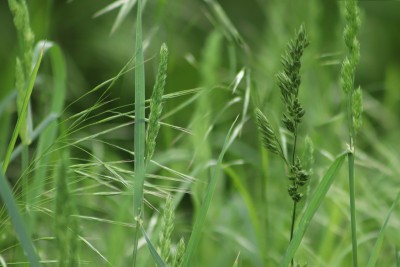The Pros and Cons of Seeding Pasture with Big Box Store Mixes
Amy Barkley, Team Leader & Livestock Specialist
Southwest New York Dairy, Livestock and Field Crops Program

As we work in our barns or sit in our houses, looking upon our fields encased in snow, we're reflecting on the year and making decisions as to which pastures we're going to renovate or improve. Once those well thought out decisions have been made, we go to order seed, only to find that prices have skyrocketed. There is also very little seed available. Both are a result of last year's drought in Oregon, where much of our pasture seed comes from. This wasn't in the plan! What do we do now?
While it can be tempting, my advice is to not source seed from a big box or garden supply store. Why not, you ask? Let's break it into pros and cons.
Pros:
You may be able to get seed this year. If the seed mixes in the stores are sourced from regions other than Oregon, there's a chance that the store shelves may be stocked, and you may be able to get something in the ground.
Cons:
What's in the seed mix? Many contractor mixes are made up of fescue, bluegrass, and ryegrass. Some strains of these grasses are palatable, but others may not be. Some may produce well, others may not. Some of the fescues may have potential toxicity issues as well, since these varieties aren't selected for grazing. You also lose the potential to select for seed that does well in partial shade, wetter fields or clay soils, etc.
Nutritional composition is highly variable. The grasses selected for these mixes are based on establishment aggression, vegetation density, growth pattern, and color. They haven't been selected for any of the features which make them good livestock feed such as fiber digestibility, palatability, and protein content.
What is the yield going to look like? Many turfgrasses have been genetically selected to stay short or to tolerate low mowing. Therefore, if you're looking for high yields or multiple cuttings, these grasses may not even have the genetic potential to perform, wasting space, time resources, and fertilizer.
Regional adaptation is important for pasture longevity and production. Many of the farm seed mixes sold in SWNY are adapted for our climate. While there are turf seed mixes adapted to the Northeast, there is still high variation there. Furthermore, by not purchasing pasture seed from a reliable source, you miss out on the expertise and advice of those who work with these varieties day in and day out, who can share which varieties will do best on your farm.
Disease resistance packages are unknown. There is a chance that turfgrasses in a mix are not bred to be resistant to the diseases that affect stands of hay and pasture in our region. Diseases like rust, blights, leaf spots, wilts, etc. may gain a foothold in a pasture or hayfield with non-resistant species.
Once the excitement of finding grass seed at a big box or home improvement store passes and the cards are laid on the table, the cons list certainly outweighs the pros. Even if this turf seed is applied to your pasture for a quick green-up this spring, you'll likely lose money in the long run from reduced quality, production, and the ultimate need to redo the pastures sooner than you would have had to if you'd purchased a quality seed mix from a reputable farm seed dealer.
Upcoming Events
Crops, Cows & Critters - Southwest New York Dairy, Livestock & Field Crops Newsletter Sponsorship
December 19, 2025
Our two forms of publications feature research-based and timely information from our four specialists, listed to the right, along with local event notifications and Cornell University outreach. This information is provided to participants who range from dairy, livestock, and field crops producers to agricultural suppliers and consultants.
Weekly Email Update: Shared with 625+ households who have signed up with our program.
Monthly Paper Mailer: To reach our stakeholders and farmers who lack internet access, we send out a monthly mailer where your company's logo and contact information would be featured with a mailing list of 330+ households.
If you sponsor our weekly and monthly publications you reach approximately 955 households.
Visit our website to view our newsletters!
2025 Cornell Food Beverage & Animal Feed Manufacturer Survey
December 19, 2025
Industry and Educational Advocates for New York State's Food, Beverage, and Animal Feed Manufacturing industries:
As you know, NYS has a diverse food and beverage manufacturing industry, in both the types of industries that exist and the wide distribution of firms by scale. Many manufacturing firms have strong backward linkages to agricultural production sectors in the state that support both farm-level and downstream food industry firms and consumers. In collaboration with the New York State Department of Agriculture and Markets, a team from Cornell University's Charles H. Dyson School of Applied Economics and Management has recently rolled out the 2025 New York State Food, Beverage, and Animal Feed Manufacturer Survey. The industry will benefit from an updated assessment of the industry that informs private and public investments and opportunities to support firm growth and improved profitability.
Cornell Organic Field Crops & Dairy Conference
March 6, 2026
Waterloo, NY
Farmers, researchers, educators, and agricultural service providers from across the Northeast are invited to the 2026 Cornell Organic Field Crops & Dairy Conference, held Friday, March 6, 2026, from 8:00 a.m. to 4:30 p.m. at the Lux Hotel & Conference Center in Waterloo, N.Y.
Co-hosted by New York Soil Health and Cornell CALS, the annual conference brings together leaders in organic grain, dairy, and livestock systems to share practical tools, new research, and farmer-tested strategies to support resilient and profitable organic production.
Announcements
No announcements at this time.





